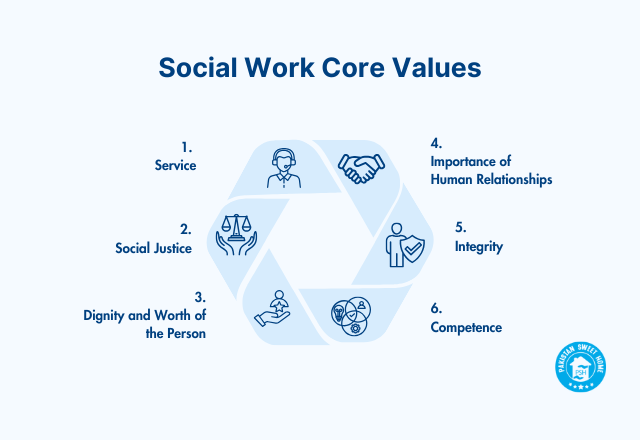Social work is a field that opens the door to many different career paths.
According to the National Association of Social Workers (NASW), social workers are present in nearly every part of our communities. They work in places like schools, hospitals, mental health clinics, senior centers, private offices, government buildings, prisons, the military, businesses, and other support organizations.
No matter their workplace or specialty, all social workers share a common goal: to make a positive impact on people’s lives.
As described in the NASW Code of Ethics, the main mission of social work is to promote human well-being. It aims to make sure everyone’s basic needs are met, that poor people, treated unfairly, or those at risk are protected.
If you’re considering a degree in social work or thinking of changing careers, here are five key areas where social workers make a difference:
1. Medical Social Work
Medical social workers help patients understand their health, make healthy choices, and find the care they need. They often work in hospitals, clinics, nursing homes, or with home healthcare services.
Some social work programs, like a Master of Social Work (MSW), have special courses that train students to work in healthcare settings.
Medical social workers operate in a wide range of environments, each presenting its challenges and opportunities. Their goal is to help patients understand the healthcare system and give them emotional support, advice, and help to get the services they need.
Where Do Health Care Social Workers Work?
Here are the key settings where medical social workers make a difference.
- Hospitals
In hospitals, medical social workers are integral to the patient experience. From pediatric wards to emergency rooms, they ensure patients and families are supported both emotionally and logistically.
Common duties include:
- Conducting comprehensive psychosocial assessments
- Helping patients understand diagnoses, treatments, and medical processes
- Facilitating transitions between departments or hospital units
- Educating families on healthcare systems, patient rights, and available resources
- Assisting in discharge planning and referrals to community support services
Hospital social workers often collaborate with doctors, nurses, and therapists to ensure a patient-centered approach to care. They also help secure medications, medical equipment, or financial assistance, especially during post-discharge planning.
- Community Health Clinics and Outpatient Centers
Social workers work in places like family clinics, community health centers, and school health offices. They help by catching problems early, making sure care continues smoothly, and teaching people about health.
Their responsibilities often include:
- Diagnosing and supporting mental health conditions like anxiety or PTSD
- Connecting patients to local services and specialists
- Educating individuals on maintaining physical and emotional health
- Coordinating between various healthcare providers
- Assisting with logistical needs like transportation or medication access
Social workers who thrive in fast-paced, preventative care environments are well-suited for outpatient centers. These centers aim to reduce hospital stays and keep communities healthy.
- Nursing Homes and Long-Term Care Facilities
In elder care settings, medical social workers focus on the unique physical and emotional needs of aging populations.
Their work involves:
- Supporting residents with cognitive decline or chronic illnesses
- Assisting families in making long-term care decisions
- Coordinating palliative or end-of-life care
- Addressing social isolation and quality-of-life concerns
They advocate for the elderly, ensuring respectful treatment and helping families navigate emotional decisions surrounding care transitions.
- Home Health and Hospice Services
For patients who prefer to receive care at home or are in the final stages of life, social workers offer a vital source of support.
Duties may include:
- Conducting home visits for psychosocial evaluations
- Helping families prepare for end-of-life care
- Coordinating in-home medical services
- Connecting caregivers to grief counseling and bereavement support
These professionals walk alongside families during incredibly vulnerable times, providing both practical and emotional guidance.
- Substance Abuse and Rehabilitation Facilities
In treatment centers, social workers are essential in helping individuals break free from addiction and rebuild their lives.
Their roles often involve:
- Assessing the extent of substance use and co-occurring mental health issues
- Building treatment and recovery plans
- Facilitating group and one-on-one therapy
- Providing aftercare planning and relapse prevention resources
They’re key players in promoting recovery and reintegration into society, often acting as advocates for vulnerable populations.
- Private Practice and Telehealth
Licensing requirements, clinical social workers can also run their practices or offer therapy remotely through telehealth platforms.
In private settings, they may:
- Provide ongoing therapy for chronic mental health conditions
- Focus on specialized areas like grief, trauma, or family dynamics
- Use evidence-based interventions tailored to individual clients
- Work independently or as part of a multidisciplinary team
This path offers flexibility, especially for those who prefer one-on-one therapeutic relationships or want to specialize.
What Do Medical Social Workers Do?
No matter where they work, medical social workers aim to make people’s lives better by helping them get the care and support they need to stay healthy.
Here’s a closer look at their day-to-day functions:
- Intake and Needs Assessment
Every journey begins with understanding the patient. Social workers conduct in-depth interviews to assess social, financial, and psychological needs.
This includes:
- Evaluating home life, support systems, and mental health history
- Identifying barriers to treatment, such as transportation or language
- Collaborating with healthcare providers to coordinate comprehensive care
- Case Management
Social workers are often the glue holding together a patient’s care plan. Through case management, they:
- Develop individualized service plans
- Monitor care progress and adjust services as needed
- Advocate for necessary treatments, housing, or benefits
- Coordinate between hospitals, home care, and other agencies
- Patient Advocacy
Navigating the healthcare system can be confusing. Social workers:
- Speak up when patients are misinformed or mistreated
- Assist with appeals, especially in insurance or Medicare disputes
- Represent patient interests in treatment meetings
They help patients understand their choices and make sure their voices are heard in a system that can sometimes feel cold and confusing.
- Health Education and Empowerment
Social workers educate patients and families about medical conditions and treatment options in a clear, relatable way. This leads to:
- Better adherence to treatment plans
- Lower levels of anxiety and fear
- Improved overall patient outcomes
- Community Referrals
A big part of the job is connecting patients to resources that lie outside the clinical environment. Examples include:
- Recommending financial aid or housing programs
- Linking cancer patients to peer support networks
- Referring addiction cases to detox centers or recovery programs
These referrals can be life-changing, providing much-needed support when the healthcare system ends at the clinic door.
2. Mental Health Services
Social workers are the largest group of mental health professionals in the U.S. They evaluate and treat people facing emotional or psychological challenges. These professionals offer therapy sessions individually, with families, or in groups in both public and private settings.
Many also specialize in trauma care, working with people who’ve gone through difficult experiences. Mental health social workers can be found in hospitals, schools, counseling centers, and even in disaster relief and legal systems.
Where Do Mental Health Social Workers Practice?
Mental health social workers dedicate their efforts to supporting individuals struggling with psychological, emotional, or behavioral issues. They serve in diverse environments designed to address mental wellness at every stage of life.
- Mental Health Clinics and Counseling Centers
This is the primary setting where mental health social workers provide direct therapy and psychological support.
Their duties include:
- Conducting mental health assessments
- Providing individual, group, or family therapy
- Developing personalized treatment plans
- Monitoring progress through regular sessions
- Collaborating with psychiatrists, psychologists, and counselors
They often help clients navigate trauma, anxiety, depression, or severe psychiatric conditions with evidence-based therapeutic approaches.
- Hospitals and Psychiatric Units
In inpatient or psychiatric wards, these social workers help stabilize patients and prepare them for reintegration into society.
They focus on:
- Crisis intervention and suicide risk assessments
- Coordinating care during psychiatric hospital stays
- Providing social work education to families about mental health and medications
- Creating discharge plans with therapy and support referrals
They work under intense pressure but play a critical role in crisis stabilization.
- Schools and Universities
Mental health social workers in educational settings help students cope with academic stress, bullying, anxiety, or developmental disorders.
Responsibilities include:
- Counseling students one-on-one
- Leading mental health awareness programs
- Referring students to psychologists or psychiatrists
- Supporting families and teachers with behavioral plans
They are often the first line of defense in identifying youth mental health struggles.
- Correctional Facilities and Rehabilitation Centers
Social workers here assist individuals coping with incarceration, addiction, or reentry into society.
Tasks include:
- Providing counseling to inmates or recovering addicts
- Supporting mental health treatment inside facilities
- Developing post-release reintegration plans
- Helping reduce recidivism through emotional rehabilitation
3. Child and Family Social Work
These social workers focus on protecting children and strengthening families. They work to prevent abuse, connect families to needed services, and offer support during tough times.
Studies show that trained social workers specializing in child welfare often produce better long-term outcomes for children and families, making their role essential to community health and safety.
Where Do Child and Family Social Workers Practice?
Child and family social workers focus on the well-being of children and families. They often work in:
- Child Protective Services (CPS)
They investigate reports of abuse or neglect and work to ensure child safety through in-home services, foster care, or adoption.
- Schools and Educational Institutions
Social workers prepare students and families facing behavioral, academic, or emotional challenges.
- Family Service Agencies and Nonprofits
They help individuals, families, and communities access resources like housing, food, counseling, and parenting classes.
- Juvenile Justice and Courts
Social workers advocate for minors in the justice system and help design rehabilitation plans.
What Do Child and Family Social Workers Do?
Their key responsibilities include:
- Assessing child safety and family dynamics
- Intervening in crises like abuse or homelessness
- Connecting families to community resources and benefits
- Supporting reunification and permanency planning
- Advocating for children’s rights and needs in school and court settings
4. Crisis Intervention
Social workers trained in crisis response help people recover from emergencies like natural disasters, violence, or personal trauma. They create safety plans, offer immediate support, and help clients prepare for future crises.
With proper training, especially through MSW programs focused on crisis intervention, social workers become well-prepared to support people in distress. They can offer both short-term and long-term care to individuals and communities during challenging times.
Where Do Crisis Intervention Social Workers Practice?
Crisis intervention social workers are often on the frontlines of emergencies and urgent situations.
They work in:
- Hospitals and Emergency Rooms
- Hotlines and Crisis Centers
- Disaster Relief and Shelters
- Law Enforcement Agencies
What Do Crisis Intervention Social Workers Do?
Their work includes:
- Conducting immediate assessments in high-stress situations
- Providing short-term counseling and stabilization
- Coordinating emergency housing, food, and safety
- Referring individuals to long-term care and support services
- Supporting victims of violence, trauma, or loss
5. Advocacy
Social workers are strong voices for justice and equality. They advocate for people who are underserved or marginalized and push for policy changes that improve lives.
Many social workers become community leaders, policymakers, nonprofit directors, or change-makers in the criminal justice system and other major institutions.
As Gloria Steinem once said, “Social workers are my collective heroes,” because they stand up for those who don’t have enough power.
Where Do Advocacy Social Workers Practice?
Advocacy social workers work in settings focused on systemic change, social justice, and policy reform. These include:
- Government and Policy Organizations: They work to influence laws and policies that impact underserved populations.
- Nonprofit and Human Rights Organizations: They champion causes like poverty reduction, disability rights, or environmental justice.
- Community Development Agencies: They work on initiatives that empower local communities.
- Research and Think Tanks: They analyze social issues and propose solutions through policy advocacy.
What Do Advocacy Social Workers Do?
Their responsibilities include:
- Identifying systemic injustices affecting individuals or communities
- Lobbying for changes in policy and legislation
- Community organizations' outreach and educational events
- Writing grants and proposals for funding social programs
- Collaborating with stakeholders to promote equity and inclusion
- Empowering marginalized populations to have a voice in decision-making
Get Started as a Social Worker with Pakistan Sweet Home
If you’re passionate about making a real difference in the lives of vulnerable children, consider joining Pakistan Sweet Home as a social worker. This organization is one of the largest and most trusted orphan care networks in Asia. It provides not just shelter but also education, healthcare, and emotional support to thousands of orphans across Pakistan.
In conclusion, understanding what a social worker does means recognizing their diverse roles across society. Healthcare social workers help patients in hospitals and clinics manage illness and access care. Mental health social workers offer therapy and support in schools, hospitals, and counseling centers.
Child and family social workers work in child welfare and schools to protect and support families. Crisis intervention social workers respond in emergencies to provide immediate care and stability. Advocacy social workers serve in nonprofits and government agencies to fight for social justice. Each plays a unique role in improving lives and meeting critical community needs.
Your Help Means the World to Orphans

info@pakistansweethome.org.pk
(051) 4865856
+92 335 1118477









